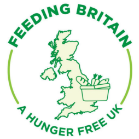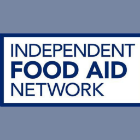From the Frontline: Sufra’s View on the Government’s New Food Strategy
August 14, 2025
The UK government's new food strategy is a topic that hits close to home for us at Sufra. It’s of particular interest as we ramp up work with leaders from different sectors across Brent to help shape a food strategy for this diverse borough, against a background of rising levels of food poverty and ill health.
Food systems are highly complex. As we've seen firsthand at Sufra, the challenges facing families struggling to access nutritious food are huge – and the situation is getting worse. Unfortunately, while the Government’s new strategy introduces some positive changes to the food system, it leaves critical issues unaddressed.
A step in the right direction, or missed opportunity?
It’s encouraging to see the government acknowledge some of the key problems we face, such as the commitment to reduce reliance on emergency food parcels. This aligns with Sufra’s long-term goal of moving beyond charity as the primary solution to food poverty – a goal broadly shared across the food aid sector. It shows a desire to address root causes rather than just manage the symptoms.
In terms of affordability and accessibility – key issues that Sufra’s guests are acutely aware of – the food strategy rightly notes that healthy food is often more expensive and less available in more deprived areas. Its goal to improve access for all could help tackle food insecurity and the health inequalities that come with it. The expansion of support schemes is therefore good news. Extending free school meals to 500,000 more children and providing free breakfast clubs in all primary schools are crucial steps to ensure our kids get the nourishment they need.
While these measures are a good start, they don't go far enough. From our perspective at Sufra, the strategy fails to address the underlying issues that drive so to our doors – some 14,000 people last year alone.
The strategy points to the need for better access to healthy food in all communities, which is exactly what we strive to do at Sufra. However, it's not clear how this would happen without greater access to kitchens and community spaces, let alone dedicated funding for charities like Sufra who are adept at supporting local communities in a dignified way.
Further, many of the families we see are living in temporary accommodation or are unable to find affordable housing. No access to decent cooking facilities or having to spend a huge proportion of income on housing makes it impossible to maintain an affordable and healthy diet. We desperately needs more social housing – in Brent and across the UK.
Beyond Food Banks
This brings us to the crux of the problem. The traditional food bank model, while providing vital immediate help, is a symptom of a much larger problem.
The primary driver of food poverty is insufficient income and, given the scale of the crisis, a more fundamental shift is needed to meet the government’s promise to reliance on foodbanks. While our ultimate goal is a living income for all, a different approach is needed in the interim.
The strategy largely ignores the inadequacy of our social security system. Job loss, sickness, relationship breakdown – unplanned life changes can happen to any of us. But years of erosion means the system is failing to provide an adequate safety net. The support now offered by Universal Credit if you lose your job does not even cover the cost of life’s essentials such as food, heating and toiletries.
The Joseph Rowntree Foundation and Trussell Trust's Essentials Guarantee for Universal Credit calls for the government to implement a protected, minimum level of support in the system. Sufra has been actively supporting this campaign and we attended their recent lobbying day alongside hundreds of representatives from communities across the UK who descended on Westminster to speak with their local MPs. I urge everyone to read more about this pragmatic and vital solution here.
A foundation, but no solution
The government's food strategy is a positive step forward, but it is nowhere near the comprehensive, transformative solution communities urgently need. It provides a foundation with a few welcome initiatives, yet it falls short of addressing the deep-seated issues of income inequality, a housing crisis and an inadequate social security system. The government must recognise that to truly tackle food poverty, we need cross-government action to enable people to afford a dignified life without relying on charity.
For more information, you can read the strategy here:
UK Governments 2025 Food Strategy
Rajesh Makwana, BEM
Executive Director at Sufra
Latest News

Sufra on Launchgood
Do you ever wish you had a magic genie that doubles your money? Well, we’ve found one! In advance of our Ramadan Appeal this year, Sufra have now joined Launchgood.

Feeding almost 200 people on Christmas Day
This year, our whole community really banded together to make Christmas 2025 one to remember. From donations from local businesses to volunteers and guests offering to clear up, it was heart-warming...











